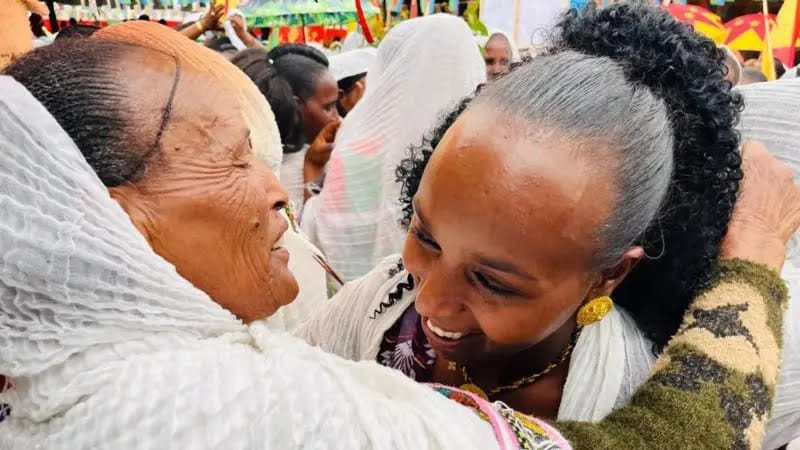For the first time in five years, residents from both sides of the Ethiopia-Eritrea border embraced in scenes of joy and reconciliation, as communities gathered in Zalambessa to reunite after years of separation.
The spontaneous border reopening, driven by local elders, activists, and religious leaders, marked a significant moment of grassroots diplomacy. Although the event lacked formal approval from either national government, sources say it proceeded with quiet support from regional authorities in Tigray and Eritrea.
Tears and laughter filled the air as families, separated by war and politics since 2020, embraced in emotional reunions. Women waved Tigrayan and Eritrean flags side by side in a powerful symbol of shared heritage and renewed hope.
“This moment is not political. It is personal,” said one elder from the Eritrean town of Senafe. “We are one people divided by lines, but united by love and history.”
The town of Zalambessa, once a bustling trade and cultural hub, became a frontline during the Tigray conflict, which began in late 2020. Since then, the area has suffered not only physical devastation but deep social scars. Thousands were displaced, and critical infrastructure—electricity, telecommunications, and banking—was either destroyed or abandoned.
Sunday’s gathering comes after local residents pushed for renewed cross-border contact. The event featured joint prayers, music, and pledges from both sides to rebuild social ties and economic cooperation. Informal trade has already resumed, with vendors using both Ethiopian and Eritrean currencies.
“Enough of conflict. We want to farm, trade, attend weddings, and mourn our dead together again,” said a woman from the Tigrayan side.
Despite the celebration, challenges remain. Thousands of displaced people, especially those living in makeshift camps in Adigrat, still lack access to basic services. Many homes in Zalambessa lie in ruins, and questions of looted property and justice linger.
Amleset, a mother of three who had fled to Adigrat five years ago, stood quietly outside her war-damaged home. “I came today just to see it,” she said. “Soon, we will return—not as refugees, but as rightful residents of our land.”
The symbolic border opening rekindles memories of the brief thaw in Ethiopia-Eritrea relations in 2018, when Prime Minister Abiy Ahmed and President Isaias Afwerki signed a peace agreement after two decades of hostility. But the Tigray war quickly eroded that progress.
Observers say it is still unclear whether this local peace initiative will spark broader political dialogue. But for those gathered on Sunday, the act of coming together was itself a form of resistance—against war, division, and forgetting.
“Peace has to begin somewhere,” said one community organizer. “If it doesn’t start from the people, where else will it come from?”



